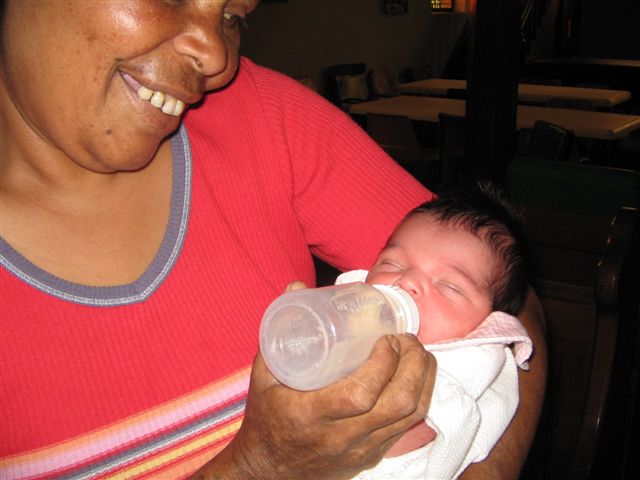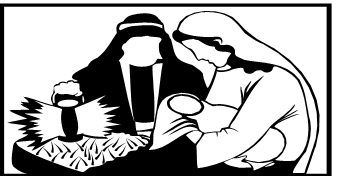Thoughts for the Month
The Jesus I know is no cold, hard Iron-Christ; nor does Jesus deserve to be reduced to smug, glib and uncompassionate irrelevancies when the real meaning of His love is what people need so desperately.
Welcome to Patricia’s new baby

She has named her baby Kiana Rose
Jesus – Right there on the fringes of society.
Have you noticed, page after page in the Gospels, that so much of who Jesus was and so much of what Jesus said and did happened among people on the fringes of His society. Call them outcasts, rejects, unproductive units of society, no bodies, sinners – they were certainly on the outer.
Jesus himself was born on the outer; he grew up unnoticed on the outer and seemed quite determined  not to become part of the establishment of His time. He recruited as friends and disciples a range of people – clearly some like Matthew, Mary Magdalene, Judas Iscariot were rejects and socially unacceptable types.
not to become part of the establishment of His time. He recruited as friends and disciples a range of people – clearly some like Matthew, Mary Magdalene, Judas Iscariot were rejects and socially unacceptable types.
And who can fail to see the central truth, especially in Luke’s Gospel; Jesus embracing, touching, befriending fringe people – the blind, the deaf, the crippled, the foreigner, the crazy boy, the insane man, the invalid woman. Not only did He offer healing to them but He defended their right to be welcomed into the mainstream community life – and challenged the mainstream people to welcome them and learn from them.
In a nutshell Jesus operated from the fringes of His society and worked and taught among the people on the fringe of His society. Surely we have no reason to be different: indeed our challenge is to be as He was.
To observe is one thing; the following of Jesus, I believe takes us further. He calls us to be involved.
Sharing the Journey
From Violence to Wholeness

Visitors from Pace e Bene
On Sunday 4th Dec we were fortunate to have two visitors from overseas to share with us their journey in Pace Bene and give us a short workshop on ways of Non-violence.
Laura Slattery and Veronica Pelicaric first shared a little of their own journey.
Laura is living in California. She had been brought up in a Catholic family where the value of service was important. As there was no money for her to attend college she joined the armed services. She had volunteered to serve in Iraq at the time of the first attack against that country. However she was sent to Hawaii and then on return she lived with five pacifists. They were able to share the concepts each had of the other Laura spent time in El Salvador and it was there she came to realise that yes, service was important but so was Justice. She was educated in non-violence and sees that in a world where we are surrounded by violence, it is important to practise non-violence to counteract the violent world we live in.
Veronica lives in Canada. Her heritage was part Croatian. She spent her childhood in Argentina and was educated in an English school. She went to college in USA and then spent 3yrs in Brazil in a Spiritual Centre. It was a very monastic style of living, having very little contact with the world. She sensed that somehow there needed to be both spirituality and Social Justice. One of the events that happened in Argentina was that her friends kept disappearing and it was this which started questions in her mind. She went to Canada and was involved in Healing work that she felt she had a gift for. It was there, in a Cree Indian community she saw such violence that she decided to work in non-violence. She is the Latin American Trainer in “From Violence to Wholeness”
We began asking the question, “How do we change?”
How do I act more non-violently in my daily life and bring about changes?
Truth passes through three stages.
- Often there is ridicule. ‘Don’t be silly you can’t change anything’
- Then comes the opposition.
- Then what has been said becomes self-evident.
It is about staying with the process of all stages.
Violence shows who is the strongest but doesn’t bring about non-violence.
In Pace Bene, relationship is seen as fundamental to the process of coming to non-violence.
Loosely translated Pace Bene means Peace and Wellness. There is a staff of 7. They see themselves as a community exploring more deeply non-violence and sharing this with others.
There will soon be a website to use – www.pacebene.org
Ghandi says, “We all have a piece of the truth.”
We were then given a copy of The Decalogue for a Spirituality of Non violence. (Rosemary Lynch, OSF and Alain Richard, OFM)
Active violence calls us:
-
To learn to recognize and respect “ the sacred”( : that of God” as the Quakers say) in every person, including in ourselves, and in every piece of Creation. The acts of the non-violent person help to free this Divine in the opponent from obscurity or captivity.
-
To accept oneself deeply, “who I am” with all my gifts and richness, with all my limitations, errors, failings and weaknesses, and to realize that I am accepted by God. To live in the truth of ourselves, without excessive pride, with fewer delusions and false expectations.
-
To recognize that what I resent, and perhaps even detest, in another, comes from my difficulty in admitting that this same reality lives also in me. To recognize and renounce my own violence, which becomes evident when I begin to monitor my words, gestures, reactions.
-
To renounce dualism, the “we-they” mentality (Manicheism). This divides us into “ good people/bad people” and allows us to demonize the adversary. It is the root of authoritarian and exclusivist behaviour. It generates racism and makes possible conflicts and wars.
-
To face fear and to deal with it not mainly with courage but with love.
-
To understand and accept that the New Creation, the building up of the Beloved Community is always carried forward with others. It is never a “solo act.” This requires patience and the ability to pardon.
-
To see ourselves as a part of the whole creation to which we foster a relationship of love, not of mastery, remembering that the destruction of our planet is a profoundly spiritual problem, not simply a scientific or technological one. We are One.
-
To be ready to suffer, perhaps even with joy, if we believe this will help liberate the Divine in others. This includes the acceptance of our place and moment in history with its trauma, with its ambiguities.
-
To be capable of celebration, of joy, when the presence of God has been accepted, and when it has not been to help discover and recognize this fact.
-
To slow down, to be patient, planting the seeds of love and forgiveness in our own hearts and in the hearts of those around us. Slowly we will grow in love, compassion and the capacity to forgive.

Journey to Birth 2005

Week 1
We are at the beginning of a journey that takes us to the arrival of one who has lived a life of TRUTH and COMPASSION. This message comes in the form of a tiny baby and in the first stage of pregnancy this tiny life of Jesus is able to float around in his mother’s womb, there being plenty of space – What Bliss! However, Jesus encountered many other situations in his life that were far from blissful and they started from birth when there was “no room at the inn”. However, with courage his parents carried on as did Jesus in his future years. Aboriginal people face and continue to face such challenges and survive! Refugees are still struggling and many others are turned away.
We pray today that in the face of closed doors we will BE AWAKE to FIND ROOM for truth and compassion, and if we can’t find it, we will make it – for ourselves and others: IN THIS COUNTRY, OUR COMMUNITY, AND IN OUR HEARTS AND MINDS.
Week 2
In this 2nd week of Advent we continue our journey with the theme of there ‘being no room’. This theme is fitting at this stage of Mary’s pregnancy since the baby Jesus has grown and there is less room in the womb for him. The boundaries of the womb are closing in on Jesus. In his adult life this was a tragic reality to the point of death and in our world today we are all too aware of the boundaries around others and us. Those who take all the power, continue to shut out the ones who have so little. WHY DO WE LIVE LIKE THIS? – TO BE POOR WHEN TOGETHER WE COULD BE RICH – RICH WITH THE BOUNTIFULNESS OF THIS EARTH THAT HAS BEEN GIVEN FOR ALL NOT JUST A FEW.
Week 3
In our 3rd week of Advent there is even less room for the baby Jesus in Mary’s womb and a feeling of fullness for Mary. Her body begins to swell as her baby grows, perhaps with fluid also.
We have heard over the weeks of there ‘being no room’ because of too much power by those who shut others out. We have heard about finding a way despite this and yet STAYED AWAKE.
We can shut others out to ensure that we have enough, and justify it with the admission of guilt believing that God forgives an abuse of such a belief. Or, we can allow ourselves to be confronted by our fear and lack of faith to experience being lost.
As Lawrence Freeman says, “The loosing is necessary although the finding shows us that what was lost was not really lost. The joy we see described in the resurrection appearances is people realizing this. ‘Don’t look for him among the dead. Here he is –See.’ A contemplative activity must be practiced that will penetrate the spirit. It is the otherness of the person we love that is the very field in which we find Jesus and in which we loose and find ourselves. True forgiveness embraces the hurt and shadow. Loosing and finding together form the whole truth that sets us free.”
And so today we can begin to rejoice in anticipation of the message of hope that John the Baptist spoke of i.e. of being set free; broken hearts being bound; the poor receiving good news and the integrity and praise springing up in the life of the eternal truth.